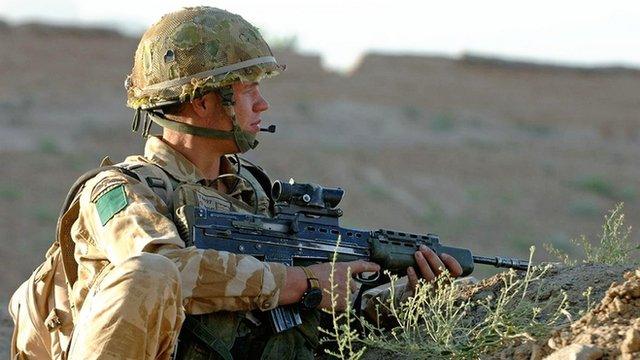Mental health of UK troops 'relatively resilient'
- Published

The study reviewed 34 published studies
UK troops who have served in Iraq and Afghanistan are coping better than US peers in terms of mental health, King's College London researchers say.
Measures taken by the UK are helping troops cope with the psychological impact of trauma, according to a review of 34 studies on its armed forces.
However, some groups, like reservists, remain at greater risk of mental health problems, the study found.
Alcohol misuse and violence are also areas of concern.
Researchers at the King's Centre for Military Health Research analysed 34 published studies on the psychological impact on the UK armed forces of deployment to areas such as Iraq and Afghanistan.
Aggressive behaviour
Where available, they compared the findings with those published on the mental health of the US military.
The report, published in the Journal of the Royal Army Medical Corps, external, found rates of post-traumatic stress disorder (PTSD) were lower for UK troops than their US counterparts, as well as rates of suicide and self-harm.
Rates of PTSD and mental disorders such as anxiety and depression were similar to those in the UK general population, the report said.
PTSD rates were higher in troops involved in direct combat, while reservists were more than twice as likely to report common mental health disorders and PTSD if they went to Iraq or Afghanistan than if they did not.
But the researchers said alcohol misuse continued to give cause for concern, affecting up to one in five regular troops, while aggressive and violent behaviour was more likely among those returning from tours, particularly those in combat roles with mental health problems.
The study's lead author, Deirdre MacManus, said: "Overall, UK military personnel have remained relatively resilient in spite of the stresses endured in Iraq and Afghanistan."
Prof Neil Greenberg, from King's, co-author of the study, added: "Not since the Vietnam War has there been so much research directed towards the mental health of service personnel.
"It remains to be seen what the longer term psychological impact of serving in Iraq or Afghanistan will be, and what social and healthcare services might be required for this small, but important group of veterans who are at highest risk of mental health problems."
'Effective support'
Peter Poole, deputy chief executive of the veterans' mental health charity Combat Stress, said while measures put in place to support serving personnel were "encouraging", the rate of those suffering from PTSD was "worrying".
"With Combat Stress seeing an increase in demand for its services every year we know we will see the legacy of the conflict in Iraq and Afghanistan for years to come," he said.
"It is vital that we are able to deliver effective support to these brave men and women so they can return to fulfilling lives."
A Ministry of Defence spokeswoman said: "This research is really encouraging but we are not complacent. We want to further reduce the stigma of mental illness and continue to better services."
- Published15 March 2013